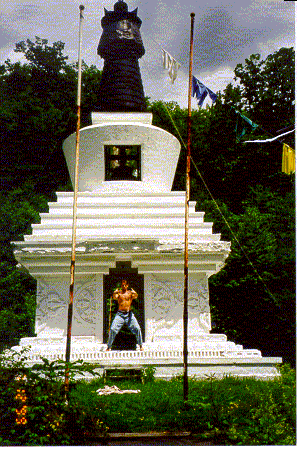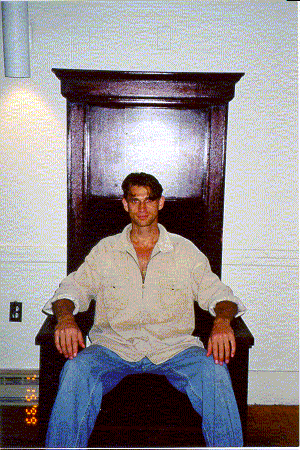By Misha Goussev, September 1999 (Previously published by The Wharton Journal).
My pre-Wharton vacation plans were rather unusual. Unlike most of my classmates who went off to travel and explore the world, I decided to spend some time in solitude in a Taoist temple in the Catskill Mountains, in Big Indian, New York. This decision was not spontaneous, since I had long been fascinated with the East and eastern traditions. However, it did puzzle some of my friends, and I was promptly labeled “monk.”
The decision was made, and I was on my way to the place where the world of the spirit is reality and the mystical chi energy is pulsating from the earth at this major power spot. It is worth mentioning that the location of the temple has a long history. For many centuries, Native American tribes performed sacred rituals on this spot and would never stay overnight, as they were afraid of contact with supernatural powers.
Not surprisingly, I was in a rather deep philosophical mood as I approached Big Indian, preparing myself for the time in solitude, away from worldly temptations. It was raining, and to tell the truth, the closer I got to my final destination, the more appealing the idea of being on a hot tropical island became to me.
I finally arrived. My doubtful state of mind did not last very long because I soon discovered that the temple was full of very beautiful young people (mostly girls) dressed in very exotic clothes. “It is not going to be that bad after all,” I thought to myself. I was a little surprised, however, to see this beauty following the way of the Tao in such numbers. The explanation soon followed: Vogue Italy magazine had come to the temple for a shoot with an eastern theme for its September issue. The little heaven did not last long, unfortunately. A few hours later, the Vogue crew packed up their equipment and disappeared just like in the Cinderella fairy tale, which made me wonder whether they had ever existed.
The next day, the fleeting memory of glamour was shattered by the experience that was by far more tangible and real. A huge black bear came out of the woods to the center of the temple to announce its presence and show us who was really in charge. The contrast was so shocking that I was literally numb with awe and admiration for a few minutes. The fear came later. Nothing really dramatic happened afterwards. The bear slowly looked around and then, without paying any attention to the humans, lazily crossed the main field and disappeared into the woods as well. At this point, I realized that the time spent here would be nothing like anything that I had experienced before.
Thus, what is Tao and what do Taoists teach? While the purpose of this essay is not to discuss the philosophical concepts of Taoism in depth, I would like to say that Tao is sharply focused on achieving harmony between one’s personal life and the universe (universal way). Taoists believe that one lives a healthy, happy, and fulfilling life through the achievement of such harmony, and one can even eventually achieve immortality through meditation and special exercises. The Taoist system is based on the concept of the chi (universal energy) that permeates everything in the universe. To put it more poetically, chi is the language of life itself and Tao teaches how to ‘speak’ the silent chi language of animals, trees, flowers, etc., or hear the inner music of the sun, moon, and stars.
While talking to trees and rocks might be a stretch for most MBA students, I would probably not be incorrect to suggest that most of us would like the idea of healthy, happy, and fulfilling life. Moreover, while achieving immortality is not my immediate goal (completing my Wharton MBA is), I certainly wanted to explore and possibly benefit from the many thousands of years old spiritual wisdom and tradition.
Being at this temple felt just like the pre-term, without the beer. The extremely international group of people represented a vast range of backgrounds: actors (Seinfeld), psychologists, doctors, healers, engineers, writers, etc. Classes, which included meditation, exercises, and lectures, started at 6:30 AM and finished at 10 PM, interrupted only by short breaks for meals. A day felt like a week and 5 hours of sleep was the norm. Despite the intense workload, nobody was terribly concerned with doing homework and preparing for exams. The place was happening.
 Taoists pay a lot of attention to the well-being of the body in order to achieve the well-being of the mind and soul. The following are some Taoists practices that I had a chance to study. Healing love teaches meditation techniques to control and transform various energies in the human body. I am sure that this class would have had a very high bidding price on the Wharton auction, since it has a lot to do with human sexuality. Chi kung provides a system of exercises for healing and increasing vitality. Tai chi, probably the most widely known Chinese practice, has many labels: martial art, meditation, dance, exercise, etc. In truth, it is all of the above. It is beautiful, tranquilizing, soothing, energizing, and invigorating at the same time. Some people consider it one of the most advanced forms of meditation. From my experience, I can say that my tai chi moves attract a lot of animals of all kinds (birds, squirrels, rabbits, etc.) who come just to watch me. My friend and famous Russian poet Igor Michalevich-Kaplan wrote the following poem about Tai Chi and I translated it:
Taoists pay a lot of attention to the well-being of the body in order to achieve the well-being of the mind and soul. The following are some Taoists practices that I had a chance to study. Healing love teaches meditation techniques to control and transform various energies in the human body. I am sure that this class would have had a very high bidding price on the Wharton auction, since it has a lot to do with human sexuality. Chi kung provides a system of exercises for healing and increasing vitality. Tai chi, probably the most widely known Chinese practice, has many labels: martial art, meditation, dance, exercise, etc. In truth, it is all of the above. It is beautiful, tranquilizing, soothing, energizing, and invigorating at the same time. Some people consider it one of the most advanced forms of meditation. From my experience, I can say that my tai chi moves attract a lot of animals of all kinds (birds, squirrels, rabbits, etc.) who come just to watch me. My friend and famous Russian poet Igor Michalevich-Kaplan wrote the following poem about Tai Chi and I translated it:
Tai chi – the movements are precise and calming,
The strong arms floating in the air of nirvana,
And healing wounds,
And guarding from the spirits of the dark
to play a wicked joke.
Yes, youth, still strive
To harvest energy for passion –
to exist and live,
To live so long to watch yourself on knees
In front of merciless age
and call for the final journey…

Therefore, what did I take away from all this? I would not call myself a Taoist, neither would I say that I share all Taoists’ philosophical concepts, but looking back, I can say that the time spent there was time spent in a different dimension of life. Every single day was charged with adrenaline and joy. The sense of unity with nature and other people took on a different and much more tangible meaning. I felt the life giving power of a healer’s touch. I heard incredible first-hand stories that can only be found in mythology and science fiction books. I felt humble and small facing the ever-present mystery of creation. I felt the cold breath of eternity and the finite nature of human life, and as a result, an extremely strong sense of appreciation for the gift of life that we all share. ▪